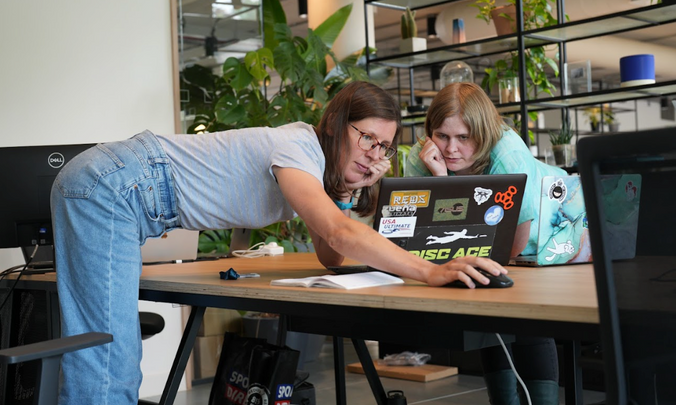
Alex's Key Achievements and Experience
- 20+ Years of Web Developer Experience
- From self-taught to a seasoned professional
- Experience in handling the mental health and emotional sides of this field, such as managing stress, burn-out and the impostor syndrome
- Extensive track record of passionately helping others and actively building a wider tech community (Norfolk Developers)
* * *
Hi, Alex! Can you start off by telling us a bit about your professional background and coding experience?
I’ve been writing code since I was around 10. It started when I discovered Visual Basic hidden away in Excel. I then spent several years building little GUIs; they could be compiled as executables that worked on any computer that had MS Office installed on it — this led to some “amusing” tales of me “having fun” in my high school!
At the time, my tiny desktop PC had no internet, a 250MB hard drive, which could just about handle Minesweeper!
A bit more down the line, when I moved to the city from my very rural home village of Ditchingham (just outside Bungay), I discovered the Forum — the only place with internet access available to me at the time. This is where I then spent days on end playing around with MySpace — I did things like exploring their HTML widgets and discovering if I could break out of the small widget space, expand to fill the full screen and create a completely custom website. Essentially, this is where my love for web development was born.
Were there any internal struggles you've overcome on your journey?
My journey into the tech industry took me quite a long time, and not in the least because of the overwhelming Impostor Syndrome I've often felt throughout it.
I probably wouldn't have been where I am now without the help of a friend who believed in me more than I did in myself at the time. He completely disregarded my self-doubt and recommended me to a digital marketing team — which is where my journey began! I got the job almost on the spot and began using their CMS to build the pages they needed. They were over the moon when I found a way to break out of the CMS constraints just as I had done with MySpace almost 8 years earlier — I'm not so sure their web agency was so pleased though! [chuckles heartily]
Soon, that very same friend recommended me to their manager and thus began my software development career at EverPress, where I furthered my skills and experience by making bespoke products and SaaS. First of which was actually a custom cushion designer!!!
From there, I bounced between startups and web agencies until finally going freelance. I've now been a self-employed, freelance web developer for 6 years — I build software, mostly CRMs and automate business processes. I also consult for startups and organisations.
Why have you decided to support Tech Educators as a mentor? What kind of support can the students and graduates expect?
I've been fortunate enough to have had a few people to rely on for actual help and advice throughout my career — their support being truly invaluable, and I would like to do the same for the new generations of developers, as I know how truly lonely and scary it can be when you're completely on your own!
I'm deeply passionate about building a community & creating a space for our tech-comrades to help each other and make the connections, very much like the ones I've been offered in the past. This is also why I offered to continue running Norfolk Developers, aka. nor(DEV), when Paul Grenyer stepped down — subtle plug: do visit nor.dev to find out more.
Programmes like Tech Ed & Codebar bring education to underprivileged and minority communities. A demographic sorely lacking in the industry and vital to ensuring the products we build are accessible, inclusive, and fit for purpose.
I hope I can help others on this journey!
Starting any course is a big commitment in terms of time and money, and it’s only natural for people to wonder if it will pay off?
Whilst I'd encourage everyone to try their hand at programming, I'd say that understanding the foundations and finding your way can be difficult — especially without the right support, you can quickly become frustrated and lose motivation.
TechEd's instructor-led courses are the ideal environment in which to take those first steps. They’re someone to rely on to give you that nudge in the right direction that can be all you need, they can help describe concepts in a language you understand with practical demonstrations.
What advice could you give to people who may find coding daunting — whether they’re thinking of changing careers or just finishing school?
I'd say passion for programming, motivation, innate curiosity, and self-discipline are key!
It's a difficult journey and one that requires you to provide simple solutions to difficult problems. That being said, once you have the foundations, learning becomes easier — soon you can chase that dopamine hit that comes with every new project, feature or bug fix, which will be all the motivation you need! 🐞
What would you say to people who are worried about finding a job after the course ends?
To quote a large UK recruitment agency:
"A government report revealed that around 82% of all jobs in the UK list digital skills as a requirement. They also pay 29% more, on average, than those that don’t require these skills (£37,000 vs £28,000 a year). Despite this, employers struggled to fill one-third of vacancies last year due to the lack of digital competency"
From personal experience, all of the software organisations that I know of in Norwich require Developers. This demand, though, creates difficulty in bringing junior developers into the industry, and a proven record for self-tuition is requisite for most to consider it.
Is there anything you would like to add?
I wanted to say that if you're passionate about getting started, I would recommend firing up your favourite Git host (e.g. GitHub) and to start building in the open. Start with what you know and like (or dislike) — rebuild your favourite website or your most-used mobile app. You can even make something like a dummy app, or just an MVP - it's the skill and the effort that counts.
What's important to show is that these projects aren't just the result of a tutorial, which one's blindly followed, but a demonstration of your own skills and thought processes: remember, there are no wrong answers!
It's also important not to become too niche in the very beginning, and to generalise your learning. Full-Stack developers are important in junior to mid-level positions, so when you've found your niche, you can then follow this into your seniority! 🎩
About the Author
James has 8 years with Fortune 200 US firm ITW, experience of managing projects in China, USA, and throughout Europe. James has worked with companies such as Tesco, Vauxhall, ITW, Serco, McDonalds. James has experience in supporting start-up and scale up companies such as Readingmate, Gorilla Juice and Harvest London. James completed his MBA at the University of East Anglia in 2018.
